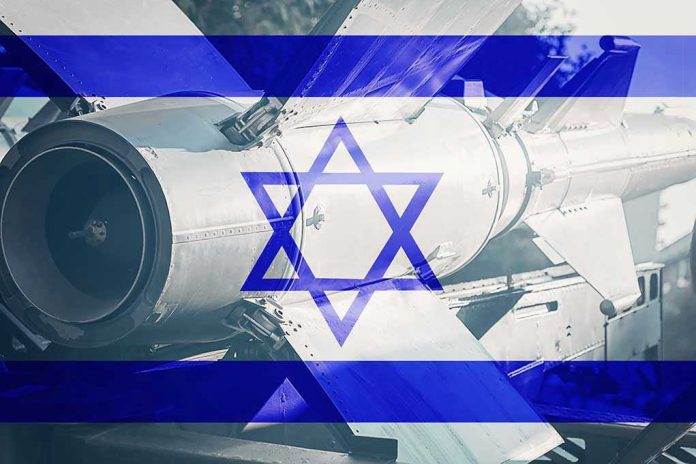
The first use of cluster munitions by the Houthis against Israel has escalated tensions, threatening further regional conflict.
Story Highlights
- Israel retaliates against Houthis following a cluster bomb attack.
- This marks the first use of such munitions in the Israel-Houthi conflict.
- Increased hostilities linked to the ongoing Gaza war.
- Potential for broader Middle Eastern destabilization.
Escalation in the Israel-Houthi Conflict
A Houthi ballistic missile struck near Israel’s Ben Gurion Airport, marking a significant escalation in the Israel-Houthi conflict. In response, Israel launched airstrikes on Houthi targets, including Sanaa International Airport. The Houthis, backed by Iran, have intensified their attacks on Israel, using cluster munitions for the first time in this conflict, a development that has drawn international concern due to the humanitarian and legal implications associated with such weapons.
The Houthis’ use of cluster bombs has been directly linked to the ongoing war in Gaza, with attacks on Israel serving as a form of pressure to halt Israeli operations there. The escalation of hostilities is part of a broader regional conflict involving multiple actors, including Iran and the United States. The Houthis, designated as a terrorist group by both Israel and the US, have become a proxy in Iran’s strategy to exert influence and challenge Israeli actions indirectly.
Regional Implications and Strategic Dynamics
The conflict between Israel and the Houthis is set against the backdrop of the Israel-Iran confrontation, with the Red Sea corridor and Israeli airspace becoming flashpoints for missile and drone attacks. Despite a US-brokered ceasefire that stabilizes Red Sea shipping, attacks on Israeli territory continue unabated. This complex regional dynamic underscores the challenges of de-escalation, as each side seeks to assert strategic dominance while mitigating the risks of broader war.
Israeli Defense Forces have intensified their military campaign, utilizing air and naval strikes to target Houthi infrastructure and military assets. The use of cluster munitions by the Houthis has drawn condemnation from Israeli officials, who have vowed further retaliation to protect national security. The conflict has also heightened tensions with other regional actors like Saudi Arabia and the UAE, who have vested interests in Yemen’s stability and opposition to Houthi expansion.
Potential for Broader Regional Destabilization
The ongoing hostilities pose significant short-term and long-term risks, including civilian casualties, disruption of air travel and shipping routes, and the potential for broader regional destabilization. The use of cluster munitions erodes humanitarian norms and has the potential to exacerbate the humanitarian crisis in Yemen. The situation remains volatile, with the risk of further escalation and destabilization if diplomatic solutions are not effectively pursued.
The involvement of multiple stakeholders, such as the US, Israel, Iran, and other regional actors, complicates efforts to achieve lasting peace. The strategic use of the Houthis by Iran to challenge Israel indirectly highlights the intricate power dynamics at play. As the conflict continues, the international community remains watchful, with calls for restraint and renewed diplomatic engagements to prevent a full-scale regional war.
Sources:
Brookings: The Road to the Israel-Iran War
ACLED: Middle East Overview June 2025
Britannica: Israel-Iran conflict
Wilson Center: Timeline Houthi Attacks




